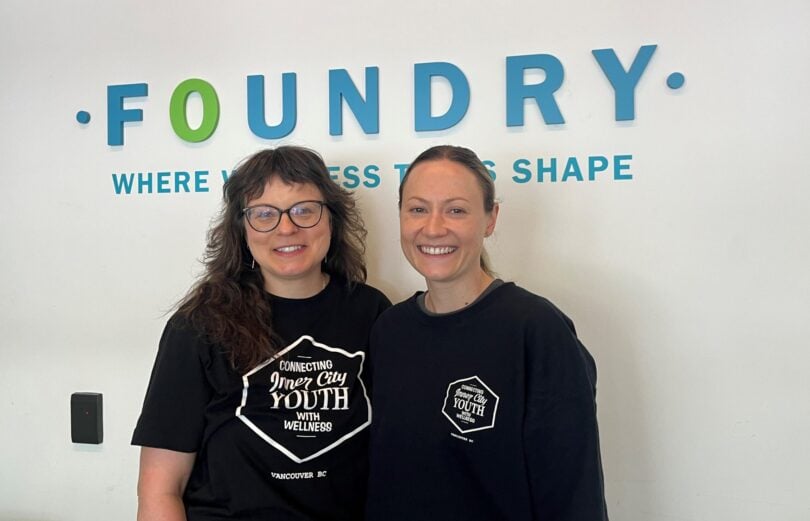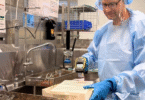For Mariah Morris and Sabine Huss, working in youth mental health isn’t just about therapy plans or clinical goals—it’s about connection, creativity, and showing up for young people in meaningful ways.
“I’ve always been drawn to people’s stories and what matters most to them,” says Mariah, an Occupational Therapist with Foundry Vancouver Granville. “Working in mental health gives me the chance to really get to know my clients—not just their needs, but their hopes, their goals, and what makes them tick.”
Sabine Huss, a Social Work Case Manager on the Intensive Case Management Team at Foundry, shares a similar motivation. “I’m a curious, lifelong learner,” she says. “I stumbled into this work through my studies in history, literature, and social work—and stayed because of how meaningful it is. The young people I work with are some of the strongest, most creative people I’ve ever met.”
Meeting youth where they are—literally and figuratively
Mariah splits her time between Foundry and Covenant House, a youth-focused centre in downtown Vancouver. She was part of the team that helped introduce occupational therapy to the space, building services from the ground up.
“One of the best parts is that we’re not stuck behind a desk,” she says. “We meet youth in the community—where they’re most comfortable.” Whether it’s a walk, coffee, or a game of basketball, Mariah uses everyday moments to foster trust. “It flipped the dynamic when a youth taught me how to really play,” she recalls. “It reminded me that we have just as much to learn from them.”
Sabine’s days are just as dynamic—and just as driven by relationship-building. “Typical days don’t really exist for us,” she says with a laugh. “We start as a team, coordinate outreach, and then anything can happen—walk-in counselling, finding pet supplies, attending care meetings, or just being a steady presence for someone who needs it.”
Both Sabine and Mariah say it’s that flexibility, creativity, and human connection that makes their work so impactful.
The team behind the work
“The hardest part is when things are out of your control,” says Mariah. “But what keeps me going is the team. They’re brilliant, kind, and collaborative—we’re in it together.”
Sabine echoes the sentiment: “My team? Best team ever,” she says. “We even have a spot on our calendar for ‘Pup of the Day’—some colleagues bring in their dogs. Our four-legged ‘wellness consultants’ are a real morale boost.”
Despite the joys, the work can be heavy—especially in the face of the ongoing toxic drug crisis. “Losing youths is unimaginably hard,” Sabine says. “But seeing someone thrive after years of struggle—that’s what reminds me why we do this.”
She recently attended a handover meeting for a youth transitioning to adult services. “They spoke so clearly about themselves and their goals. Watching that moment of growth—it was beautiful.”
Changing the conversation around youth mental health
Both Mariah and Sabine have seen the dialogue around mental health evolve over the years. “There’s more openness now,” Mariah notes. “More people asking questions, wanting to understand.”
Sabine adds, “People sometimes forget that youth are so much more than their diagnosis. They’re artists, pet-guardians, siblings, students, friends. They’re resilient, insightful, and deeply capable.”
Walking the walk
As allied health professionals, both Mariah and Sabine are intentional about protecting their own mental health, too. “I try to walk the walk,” says Mariah. “Spending time with loved ones, doing things that bring me joy—that’s what keeps me grounded.”
Sabine agrees. “I try to do what I tell the youth: eat and sleep well, go outside, build community. And laugh with my team—it really helps.”
Advice for the next generation of mental health workers
Thinking of a career in mental health? “Explore your options,” says Mariah. “There are so many ways to make a difference. Shadow someone, ask questions—see what feels right.”
And for those considering Providence Health Care, Sabine has this to say: “If you’re interested in working with compassion, social justice, and care at the center of everything—Providence Health Care is a good place to be.”
Join us in supporting mental health—because people need people.
Whether you’re thinking about a career in mental health or looking for a way to make a difference, there’s a place for you at Providence Health Care. Learn more about our open roles and discover how you can help change lives from the inside out.
Want to support the Foundry team and the impactful work they do every day? Your donation helps ensure patients receive compassionate, comprehensive care when they need it most.
Donate to Mental Health Services at Providence
Together, we can break the stigma, build connections, and show that mental health matters—today and every day.
Read more stories like this:
- MENTAL HEALTH WEEK: SUPPORTING NEW PARENTS THROUGH COMPASSION AND EDUCATION
- MENTAL HEALTH WEEK: A HEART FOR HEALING IN GERIATRIC PSYCHIATRY
- MENTAL HEALTH WEEK: FOOD, FREEDOM, AND HEALING IN EATING DISORDER RECOVERY
- MENTAL HEALTH WEEK: SUPPORTING THE WHOLE PATIENT WITH CIRT





